Spotlight on Dietitian Speaker Christine Rosenbloom

AC: Looking back, how did you get started speaking as a dietitian, and how has your speaking evolved through your career?
CR: It was in one of my very first jobs. I worked with a preventive cardiology group in a cardiac rehab program in Atlanta. This was back in the 1980s when there weren’t a lot of people doing preventive nutrition. We would do workshops twice a year for other health professionals and physicians in our area, and they became very popular. Those were my first opportunities to speak, and I found not only did I enjoy it, I learned a lot, too.
About that same time, I got into the Academy’s Spokesperson Program. They still have the program, but it’s not quite the same. At that time it was based on geographic area, and I was the spokesperson for the Atlanta area. In their media training, you learn how to deliver your key messages, how to get your points across in a television interview or other kinds of media. I think those skills helped me in my speaking because they translate well into other kinds of presentations.
When I was working at Georgia State University I spoke a lot in the area of sports nutrition. More recently, since I retired from the University, I made a shift into speaking about healthy aging. About three years ago I wrote a book called Food and Fitness After 50. It’s consumer focused and published by the Academy. I enjoy focusing on this area because it’s relevant to me and also to a very wide audience.
AC: That’s fantastic how you’ve made media training and speaking and writing all overlap with each other. What about charging? How has that fit in for you, and do you have any advice for other dietitians who find it challenging?
CR: I think it’s challenging for dietitians in general and particularly for women to ask to be paid and for what we’re worth. As I was coming up in the field, I started to submit proposals to speak at meetings. Whether it was to the ACSM (American College of Sports Medicine) Health and Fitness Summit, or Dietary Practice Groups, or state media meetings, and even FNCE… A lot of those pay, but not a lot. But it was good exposure and it really helped to build my resume.
Now when I quote speaking fees, I do it based on the audience… If it’s going to be a keynote versus a breakout session or if it’s going to be a thousand people versus a room full of people… I think it really depends on what your audience is and what that benefit might be to you.
I still do some free presentations, mostly local in my community. But then if I’m doing them for, let’s say, a big corporate sponsor, I’ll ask for higher fee. I think it helps to have an idea of what you want. And one way to get started with that is to have a fee schedule and send it to the folks.
Another thing I always tell younger dietitians is ask them for their budget up front. Don’t be afraid to ask because everybody does it. And if they say they don’t have any budget, then you have to make a decision. Is it worth your while to do it? Like I said, if it’s for a big company or a corporate sponsor and they say they don’t have a budget, I usually say to myself, Well, then I don’t have a speech. Because I think a company that’s making a lot of money on it, they definitely need to pay. You also can phrase it as here’s what your “honorarium” is, that sounds better than “this is how much money I want.”
The thing you’ve got to avoid is when you’ve already done the talk and then you say, “OK, what are you going to pay me for that?” and you find out they weren’t going to pay you. That’s going to leave hard feelings all the way around and some awkwardness.
My best advice is to value your worth and at the same time to have some flexibility. You put in a lot of time to do the presentation and you put in a lot of time in your education. Value your experience. The flexibility comes in when you find other benefits that aren’t money.
Like I said, now I do a lot of talks in my local community and they’re free. But it benefits me because I sometimes can sell my book or I’ll ask them for other things that benefit me in the long run. Would they talk about it in their newsletter and put my website in there? There are things they can do to enhance what you do without necessarily getting paid. Those are the things you have to weigh in your mind. What’s the benefit? Especially if you have a book you’re promoting, ask them, Can I sell my book? You’ll find that if you bring books and you sell them after a talk, people are going to buy them, especially if you take that square with you and you can use credit cards.
When I do some of those free speaking sessions, I treat it as a focus group, and really pay attention to the audience questions. When I get a lot of good questions, there’s a lot of good information and insight I get about my target audience. I can also ask them questions. That free speech focus group can help me improve or come up with other presentations that are paid. It can help me with my blog. It can help me write articles. I’m always trying to think about ways that I can get some benefit from it, even if it’s not monetary.
AC: That’s a great idea to use the Q&A as a launch pad for other ideas. I’m actually working with Jessica on a book of just questions and answers from her presentations. Shifting gears, what do you like to see in a speaker when you’re in the audience? What qualities are memorable to you, or make you think, “This is a great speaker”?
CR: Several main things. One is enthusiasm. When you can tell a speaker enjoys what they’re doing and shows they enjoy what they’re doing.
Having a sense of humor. Sometimes it can be self-deprecating humor where you just tell something funny about yourself or a story about yourself.
That goes into the idea of storytelling. People love anecdotes. I don’t mean to use anecdotes as scientific evidence, but you can use anecdotes to enhance what you’re talking about.
A sense of purpose. One of the biggest challenges is I when you want to tell the audience everything you know, and you can’t. It gets back to what I said about media-type messaging. What are your key messages? What do you really want to get across? You have to edit that down to a realistic point.
And then last is some audience involvement, whether that’s a polling slide or some opportunity for the audience to get a little bit engaged with you. I think that can help a lot to keep them engaged with your presentation.
AC: I feel like listening to you now I can spot your media messaging training. You demonstrated it right there with your concise list of important qualities. Would you share one of your anecdotes with us? A story about a speaking experience that stands out in your memory as either amazingly great or amazingly terrible?
CR: Sure. One amazingly great memory is being invited to Zurich, Switzerland to speak to FIFA, which is like the NFL on steroids. It’s the international football association, but what we call soccer. I was talking about females and youth soccer because I did a lot of work with female soccer. That was really a highlight for me, getting to travel there and engage with a lot of researchers involved in sports science.
Then in terms of amazingly terrible, I was speaking at our local dietetic association meeting and I got the day wrong. So at 12:30 on a Wednesday, my department chair was calling me, saying, “Where are you? You know, we’re here at the conference room and waiting for your talk, you’re not here.” And I said, “Oh, it’s tomorrow.” “Nope. It’s today.” I had it on my calendar for the right day, but my brain somehow said Thursday. So that was pretty bad. I actually missed my presentation. We all do things like that.
AC: I can understand why that goes in the terrible column. Let’s focus on the great. Have you had other opportunities to speak outside the US?
CR: I have. I was invited to speak to the International Olympic Committee in Lausanne, Switzerland. I spoke to that group back in 2016. And I’ve done a few other international presentations. I did one in Budapest. It’s always fun to do presentations outside of your area and learn different things from the audience.
AC: Those sound like really interesting experiences. What about any really pivotal learning experiences for you as a speaker? Any moments where you realized something you wish you had known sooner?
CR: I think the first is less is more when it comes to content. I probably have ten times more information than I’m going to share or that I want to share. It doesn’t go to waste because I might use it for a blog post or I might use it for an article I’m writing. I try to figure out what’s the most important thing to get across that would be best in a presentation versus one of those other formats.
And then also less is more when it comes to your presentation itself. I think we all did “death by PowerPoint” when it first came out. It’s such a cool tool, but we just overdid it. Too many elements on a slide. I still see that today with researchers who have four graphs on a slide. And they’ll start out by saying, “I know you can’t read this,” and I always want to scream, “Then why are you showing it?”.
I’ve really pared down my presentations. Sometimes it’s just a picture or a couple of words, because if people are reading your slides, they’re not listening to you. I really try hard to pare it down now, whether it’s doing webinars, which we’ve been doing a lot of in the pandemic, or even a regular presentation.
It’s hard because you do want to put so much on, but I always try to tell myself, “Remember, you can also give handouts.” You can give a set of slides to the audience in a handout without needing to show all those elements on the screen. I think that’s one of the things that I really learned and I’m still learning and continuing to work on.
Another thing in terms of lessons is it’s OK to be nervous. I still get nervous when I do a presentation. I think that shows that you’re invested in it and you have some real interest in it. It’s OK to be nervous. I think public speaking is the number one fear that people have. But so many people in our field have so much to offer. I get frustrated when I go to FNCE and it’s the same speakers over and over again. I want to hear more young people get involved and share their experiences and their expertise.
Another thing that I’ve learned is it’s OK to over-prepare. It doesn’t hurt to over-prepare. I think that gives you a lot more confidence when you go into a presentation. The more you’ve investigated the deeper questions why something happens or why did the researchers find something, the more prepared you are when it comes time for the Q&A.
The other thing I’d say is that if you don’t know the answer to the question at the end, just say so. It’s fine to say, “I don’t know the answer to that question, but I’ll find out and I’ll get you an answer.” A lot of times if it’s a huge presentation, you’re not going to know all the participants, so I will say, “Before you leave, come up and give me your card and I’ll get back to you with that information.” I was a professor for 30 years and I always found that students who tried to fake it got themselves into a lot of trouble. It’s better to just to say you don’t know, but you’ll find out.
AC: That’s a worry I think a lot of speakers have, not being able to answer every question. It’s good to know that being honest is the way to go.
CR: It sure is. Recently I was attending a webinar and somebody said, “What is all of this hygiene that we’ve been practicing with hand sanitizer, washing down our countertops… What’s that going to do to the bacteria in our gut microbiome?” And I thought, good question, but we don’t know the answer to that. This is all so new. So it’s OK. Sometimes I will say that to an audience member. Something like, “That’s a really good question, but there’s just no research on that. So let’s keep an eye out for it.” That’s the best we can do.
AC: Thank you Chris for such great advice and for spending your time with us.
To hire Chris for your next speaking engagement visit her site at chrisrosenbloom.com
Follow Chris on social media: Facebook @ChristineRosenbloom, Twitter @chrisrosenbloom, Instagram @chrisrosenbloom, and LinkedIn @ChristineRosenbloom.
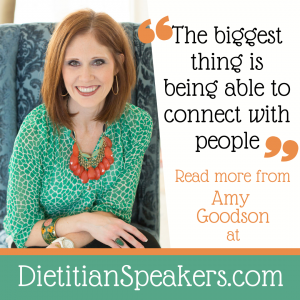
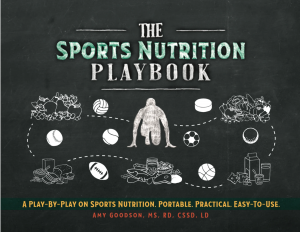
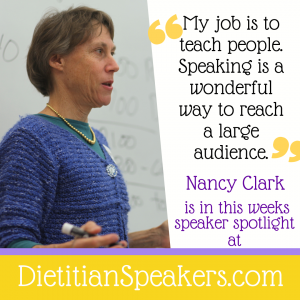 Superstar alert! Dietitian Speaker Nancy Clark is the
Superstar alert! Dietitian Speaker Nancy Clark is the 
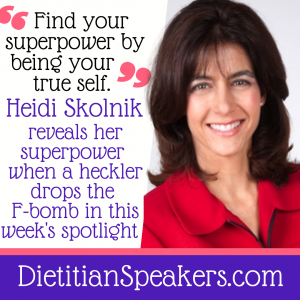
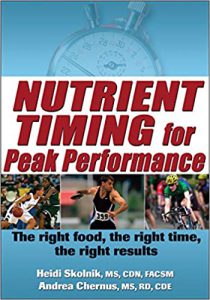
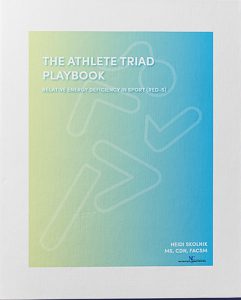
 Alex Caspero is a Dietitian Speaker who knows how to pivot. From growing her speaking niche to adapting to covid life, read on for her take on professional speaking and why it’s good to feel uncomfortable.
Alex Caspero is a Dietitian Speaker who knows how to pivot. From growing her speaking niche to adapting to covid life, read on for her take on professional speaking and why it’s good to feel uncomfortable.